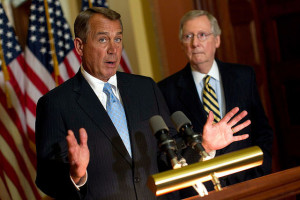
House Speaker John Boehner (R-OH) (L) and Senate Minority Leader Mitch McConnell (R-KY) (R)
President Barack Obama and other White House officials (such as Communications Director Jennifer Palmieri and Press Secretary Josh Earnest) have been quick to characterize Tuesday’s Republican Election Night victories as the beginning of a period of Republicans being “partners in governing” the United States. For example, at his post-election press conference on Wednesday, President Obama said:
… So I look forward to Republicans putting forward their governing agenda…. I am very eager to hear Republican ideas for what they think we can do together over the next couple of years…. I’m looking forward to them putting forward a very specific agenda in terms of what they would like to accomplish…. And what we’re going to make sure that we do is to reach out to Mitch McConnell and John Boehner, who are now running both chambers in Congress, and find out what their agenda is. And my hope is, is that they’ve got some specific things they want to do that correspond with some things that we want to get done…. They’re the majority. They need to present their agenda.
This is an important Democratic frame, because, up to now, the Republicans have acted as a minority party even though they held a majority in the U.S. House of Representatives. However, President Obama tried this “shared responsibility” frame once before, after Republicans took over the U.S. House of Representatives in 2010, and the frame did not stick. The question is whether Republicans will be held responsible for co-governing now that they will also run the U.S. Senate.
Absent an effective attack by the Democrats, the Republicans have, to this point, had the best of both worlds: they tried to block all of President Obama’s initiatives, such as on rebuilding America’s infrastructure, then blamed Obama for the resulting Washington gridlock. And where President Obama and the Democrats have achieved success, such as on economic growth, job creation and deficit reduction, the Republicans have distracted from these topics with small shiny objects like Benghazi, the I.R.S., Ebola, the Secret Service and ISIS that the cable television news networks gleefully featured. Going forward, the issue will be whether the Democrats allow the Republicans to continue to act as a minority party, or whether the Democrats will hold Republicans accountable for co-governing, which includes going on record with votes and trying to pass legislation.
Thus far, the Republicans have sent mixed messages on whether they want to act as a majority party in Congress. For example, House Speaker John Boehner and soon-to-be Senate Majority Leader Mitch McConnell were quick to say they want Republicans to vote yet again to repeal the Affordable Care Act, and to approve the Keystone XL oil pipeline from Canada even before the State Department completes its required review. However, Boehner and McConnell also said that, if President Obama takes executive action on immigration reform, the Republicans won’t pass any immigration reform bill. That position makes little sense, since (a) it would keep in place whatever action President Obama takes, instead of supplanting it with Republican-drafted legislation; (b) taking no action on immigration reform would further alienate Latino voters who are already very upset with Republican immigration inaction to this point, and (c) it’s downright petulant. Even Republican U.S. Senator Lindsey Graham has said that, if Republicans in Congress don’t help to pass an immigration reform bill, the Republican Party will find itself in “a demographic death spiral” by turning off the ever-growing bloc of Latino voters.
Right now, President Obama and the Republican leadership are engaged in high-stakes brinksmanship over immigration, which could be seen as a test for future battles. President Obama seems to think that, if he threatens executive action, Republicans will agree to pass immigration reform legislation more quickly, i.e., this year. Republicans seem to be making the calculation that, if they hold off on immigration reform until the next session of Congress when the Republican majority takes over in the Senate, they can come up with a new immigration reform bill that is more Republican, rather than passing the bipartisan bill that the Democratic-controlled Senate passed in 2013 but which was blocked by Republicans in the House. Then, as with other right-wing bills that the Congress will likely pass next year, if President Obama vetoes the bill as too extreme, Republicans can try to paint Obama as the one obstructing the nation’s business.
It’s an open question whether the mainstream media, which largely permitted Republicans to sit on the sidelines and obstruct instead of participating in governing for the past six years, will continue to give Republicans such a pass when the GOP takes over the Senate. In a press conference yesterday, CNN’s Dana Bash appeared not cut the Republicans such slack when she asked House Speaker Boehner:
How do you expect the president to trust that you really want to work together, when out of the gate you say you want to repeal his signature law [the Affordable Care Act] that you know has no chance of getting a veto-proof majority? How do you expect him to trust you?
However, it is not clear whether other members of the press, and the Democrats, will similarly hold Republicans accountable to participate in governing America over the next two years, and whether the White House frame of the Republicans as having to “co-govern” now or be blamed for inaction will stick this time. Stay tuned.
Photo by Peter Stevens, used under Creative Commons license. http://is.gd/RkUouk


